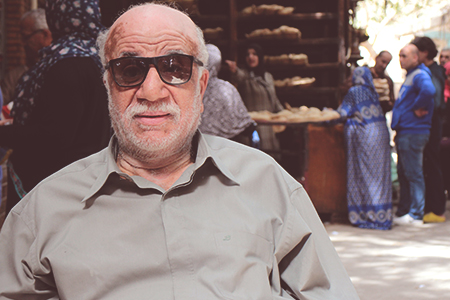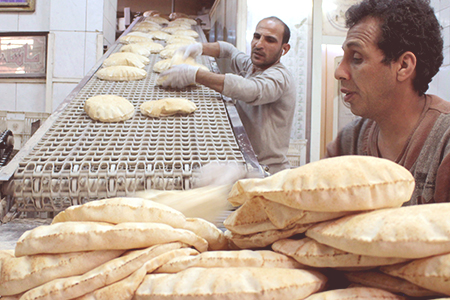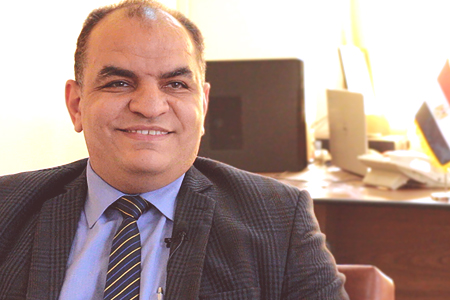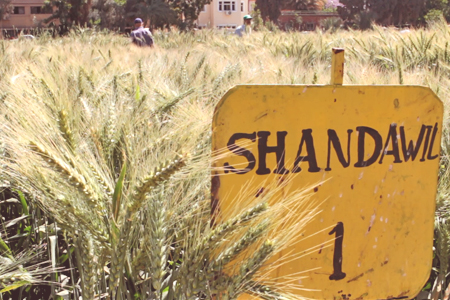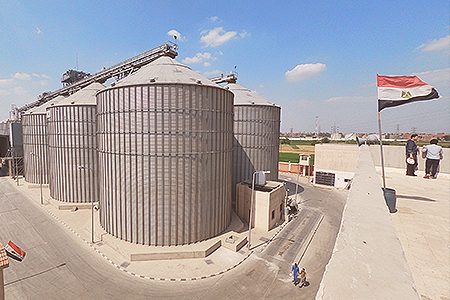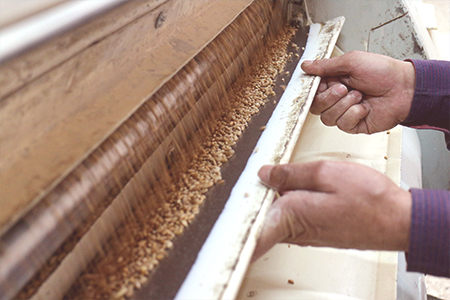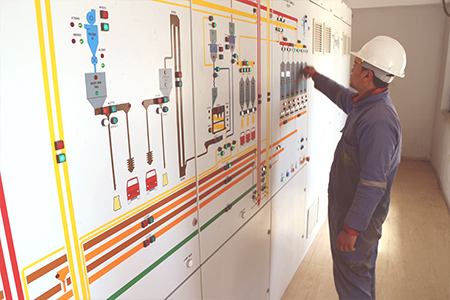Growing Egypt's wheat supply
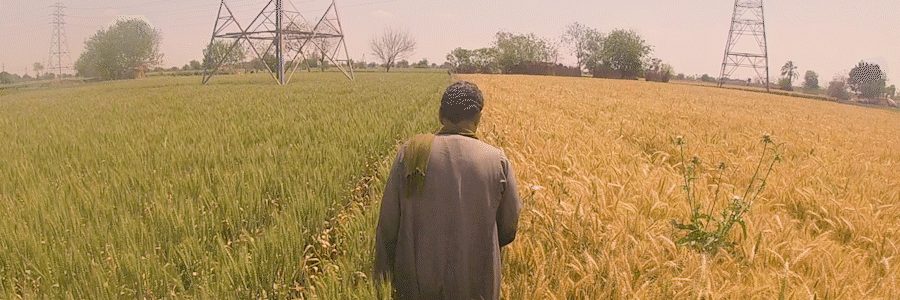
A farmer walks through his wheat field looking for weeds or signs of pests.
Egypt, April 2019.
Egypt is improving its wheat supply chain to meet growing demand for bread. FAO and the EBRD are supporting the Egyptian Government and the industry in their efforts.
“I feel proud because I provide the most important thing for Egyptians,” says Adel, the owner of a small automated bakery in central Cairo. “Baking is our social platform. We have good relations with our loyal customers, and we attend to their needs. We are a close-knit community. If there is any problem, we can solve it together.”
Baladi is a traditional flat bread – a mainstay of the Egyptian diet, usually eaten at every meal. It is commonly referred to as “eish”, which means “life” in classical Arabic.
The Government has long subsidized baladi bread made from 82 percent wheat flour extraction, with wheat it has purchased domestically and abroad.
Under the Egyptian ration card system, the cost of a loaf – five piasters – has not changed since the 1980s. At that rate, one US dollar could buy 358 loaves.
To keep this guarantee and feed its vast and growing population, Egypt has become one of the world’s leading wheat importers. It imports over 12 million tonnes of wheat – a figure likely to increase to more than 15 million tonnes by 2028.
The country is upgrading operations across its grain sector – from regular plant health inspections and quality controls to proper storage and transportation – and working to resolve bottlenecks throughout the entire supply chain.
This will allow the country to manage the large volumes of imports more efficiently while also safeguarding basic food security and consumer safety.
Left: Adel outside his automated bakery. Right: Workers picking up the oven-hot bread as it comes down the conveyor belt.
Cairo, Egypt, April 2019.
Quality control
Plants are under constant and increasing threat from pests and diseases. The Egyptian Government is concerned about the risk of introducing ambrosia, ergot fungus and other foreign pests.
Contaminated shipments can infect local grain supplies, threatening food safety and plant health. They can also erode trust among trading partners, and ultimately consumer confidence in the safety of the bread, leading to heavy economic losses.
Phytosanitary and food safety inspections based on proper product sampling are essential for keeping Egyptian grain products safe.
Ahmed EL-Attar, Head of the Central Administration for Plant Quarantine (CAPQ) of the Ministry of Agriculture and Land Reclamation, explains that the “CAPQ is doing the necessary work to control and closely monitor all incoming grain shipments to stop any disease or pests.”
When ergot was detected in some wheat shipments, he recalls how CAPQ worked with the Plant Pathology Research Institute of the Agricultural Research Centre to devise a way to prevent the disease from spreading to the fields and infecting wheat seed.
They moved the wheat from the ships to the port silos where they sieved and examined the grain. Once they ensured the ergot rate of infestation met the food safety tolerance limit (0.05 percent), they released the wheat from the port silos.
This approach saved precious time by preventing major delays in the supply chain, while also eliminating the threat of disease to Egyptian agriculture.
Left: Ahmed EL-Attar, Head of the Central Administration for Plant Quarantine (CAPQ) of the Ministry of Agriculture and Land Reclamation. Right: One of the fields where the Ministry carries out crop research.
Cairo, Egypt, April 2019.
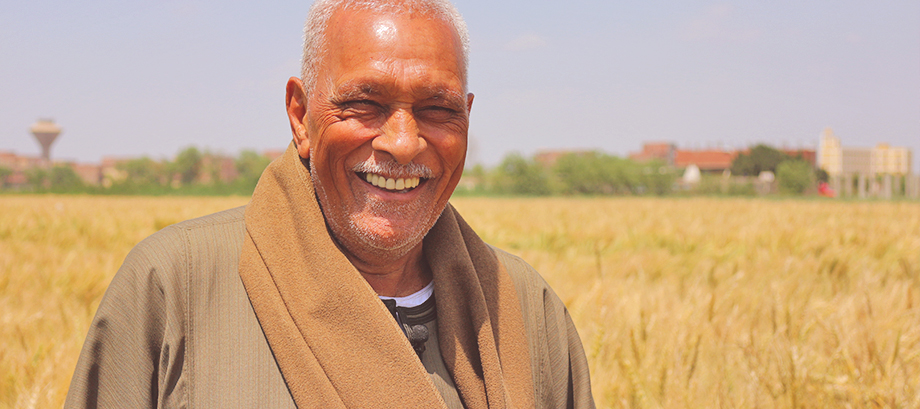
For Salah, who has been growing wheat with his family for 50 years in the Qalyubia governate located north of Cairo in the Nile Delta region, keeping his crops free from weeds and disease is essential.
Qalyubia, Egypt, April 2019.
Greater efficiency along the supply chain
Several public entities and private trading companies are involved in managing the heavy flow of wheat imports into Egypt and moving them through the supply chain.
The shipments first arrive in Egypt’s ports and are stored in port silos. They are then transferred to inland silos before heading to the mills to be ground into flour to make the bread sold in bakeries.
But if the wheat is not stored properly or delivered in a timely manner, it can spoil.
Large grain shipments can sometimes overwhelm local storage space, so they end up sitting in the port for a long time.
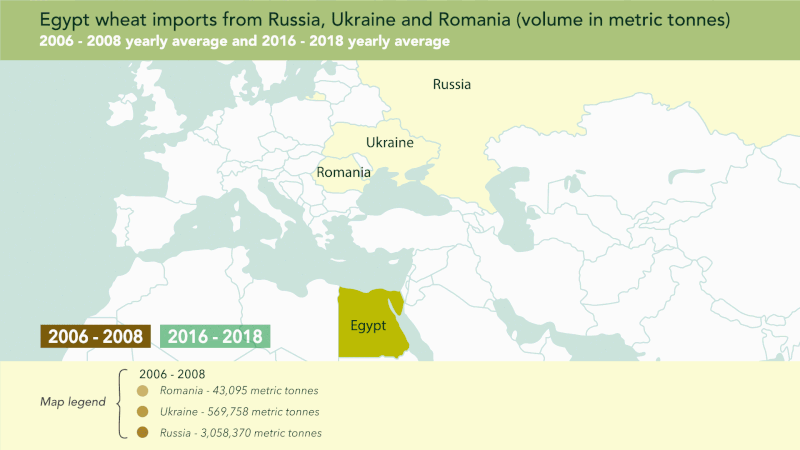
Wael Abbas, the Minister’s Assistant to the Ministry of Supply and Internal Trade, explains that because wheat, both local and imported, is the top strategic commodity in Egypt, they are “increasing the capacity of silos for imported wheat to be stored.” This also includes investing in building silos closer to wheat fields to alleviate pressure during the harvest.
Habib Abdullah, a silo operator, says that much can be done to shrink the time shipments spend in the ports through standardized inspection controls and better alignment with international best practices.
“We can improve the quality of the wheat we receive and the filtration system and reduce the time spent on off-loading vessels, which would greatly reduce costs,” he says. Discussions from public-private dialogue show that better practices in the discharging of bulk grains and a reduction of the handling time and storage costs could result in savings of USD 1 billion for the Egyptian economy in the next decade.
Left: Wheat silos. Right: Wheat being filtered and processed in one of Cairo's flour mills.
Cairo, Egypt, April 2019.
Dialogue yielding results
In light of this, FAO and the EBRD have worked as neutral brokers with the Egyptian Government and private sector under the Public-Private Dialogue in the Egyptian Grain sector project.
This dialogue has resulted in important regulatory and policy changes, like greater reliance on private sector inspection companies in the port of exports and transition to more targeted consumer subsidies.
FAO Senior Economist Dmitry Prikhodko says that their engagement with public and private partners on specific grain sector issues “has resulted in better coordination on plant quarantine, grain quality and other issues leading towards improved sector performance and increased investment in Egypt.”
FAO and EBRD are also looking to reduce transaction costs by introducing e-phytosanitary certificates into the Egyptian grain trade.
Going paperless would ease the administrative burden of issuing roughly 200,000 paper phytosanitary certificates each year to process grain cargos.
“Good cooperation between the public and the private sector is key to improve the efficiency of the grain supply chain. Coordinated approaches can spur innovation. Policy transparency and predictability can result in a business environment more conducive to investments,” says Natalya Zhukova, Director Head of Agribusiness, EBRD.
The two institutions continue to bring public authorities and private companies together – including the Egyptian Grain Suppliers Association (EGSA), created to give a voice to grain traders – to discuss how best to advance the sector and make it stronger and even more efficient.
Left: Operator monitoring the ventilation of the wheat silos. Right: A mill worker supervises the conveyor belt loading flour sacks into the vans.
Egypt, April 2019.

